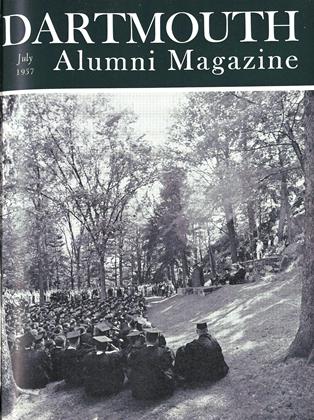On Great Issues in the Anglo-Canadian-American Community
IF I am able to attend I expect to have something to say. Don't expect me merely to mouth the usual pious platitudes."
This was the reaction of one of the prospective participants when he was invited to take part in "The Dartmouth Convocation on Great Issues in the AngloCanadian-American Community" September 5-7.
He was assured by Arthur E. Jensen, dean of the faculty and chairman of the Convocation Steering Committee, that this was precisely the attitude Dartmouth sought when the convocation idea was broached.
From the first, the hope of the Convocation committee was that this get-together would provide a forum for the airing of the "Great Issues" that have strained the historic relationship between the three nations.
It seemed a particularly appropriate way to celebrate the 10th anniversary of the widely copied "Great Issues" course at Dartmouth since it will bring to Hanover prominent figures from the three countries for speeches and panel discussions that will attempt to define these issues.
As of July 1. speakers who have accepted invitations „ include:
From the United States - Sherman Adams, '20, assistant to President Eisenhower; Christian Herter, undersecretary of state; Paul G. Hoffman, U. S. delegate to the United Nations General Assembly; Allan Nevins, professor of history at Columbia; and Clarence B. Randall, former chairman of the board of the Inland Steel Company.
From Britain - Sir Geoffrey Growther, former editor of The Economist of London, and Arthur Goodhart, the master, University College, Oxford.
Honorary vice-chairmen for the Convocation are S. Pinkney Tuck '13, former US Ambassador m , , . Canal Company; Robert J. Breyfogle '26, vice-president and manager of the First National Director of the Suez Oelman '31, President of the National Cash Register Company. Bank of New York, London; and Robert S.
From Canada - Edgar Mclnnis, president of the Canadian Institute of International Affairs, and Sidney Smith, president of the University of Toronto.
In addition a top Government official from both Canada and Britain is expected to accept an invitation.
The convocation comes at a critical time in the history of Anglo-Canadian-American community. The minor tensions that always beset even the closest friendships have been multiplied by differences over the Suez crisis, Britain's decision to expand trade with Red China, and her withdrawal from some of her global military commitments among other things.
The recent election victory of the Progressive Conservatives in Canada on a platform calling for closer ties with Britain and minimizing financial dependence on U. S. capital may also cause some ill feeling on both sides of the border.
But - and this is an important but - seldom in history have three nations been more eager to agree and seldom has a resolution of differences been more important to the free world.
The tentative program calls for an address of welcome by President Dickey and a keynote speech by Chairman Douglas on Thursday night. On Friday morning a panel will lead off by attempting to define the "great issues" that face the three nations. Dedication of the Charles Ransom Miller Public Affairs Laboratory will follow.
Friday afternoon panelists will explore the relationships among the three nations and their place in the international community.
A major address by Sherman Adams and awarding of alumni citations is slated for Friday night.
The Saturday program calls for a panel discussion of the paths to unity in the community, bestowing of honorary degrees, a major speech by Christian Herter, and an evening program of three addresses.
The Friday night program also includes presentation of alumni awards to graduates nominated by the entire alumni body of 28,000.
Fortunately, the Convocation takes place at what many consider the finest time of the year in Hanover. The golf course will be open, the tennis courts will be available and rides into the mountains will be enjoyed in free time during the convocation.
Detailed plans are now being worked out to offer the very best possible accommodations at reasonable cost. A package rate of $28 per person has been set for those wishing to stay in dormitories. It includes typical dormitory accommodations and cafeteria meals in Thayer Hall from dinner on Thursday the fifth through breakfast on Sunday the eighth. A limited number of accommodations in nearby motels and hotels, at higher cost but with private bath, will be available for those who prefer them.
Lewis W. Douglas, Chairman of the Convocation
Sir William Haley, Co-chairman of the Convocation
Arthur H. Sulzberger, Co-chairman of the Convocation
Christian Herter
Sherman Adams '20
Clarence B. Randall
Sir Geoffrey Crowther
Paul G. Hoffman
 View Full Issue
View Full Issue
More From This Issue
-
 Feature
FeatureHopkins Center and Dartmouth Hall
July 1957 By CHURCHILL P. LATHROP -
 Feature
FeatureThe Commencement Address
July 1957 By DOUGLAS HORTON, D.D. '57 -
 Feature
FeatureThe Fifty-Year Address
July 1957 By JAMES M. O'NEILL '07 -
 Feature
FeatureThe Seniors' Valedictory
July 1957 By LLOYD L. WEINREB '57 -
 Feature
FeatureThe Honorary Degree Citations
July 1957 -
 Feature
FeatureThe 1957 Commencement
July 1957 By GEORGE O'CONNELL








